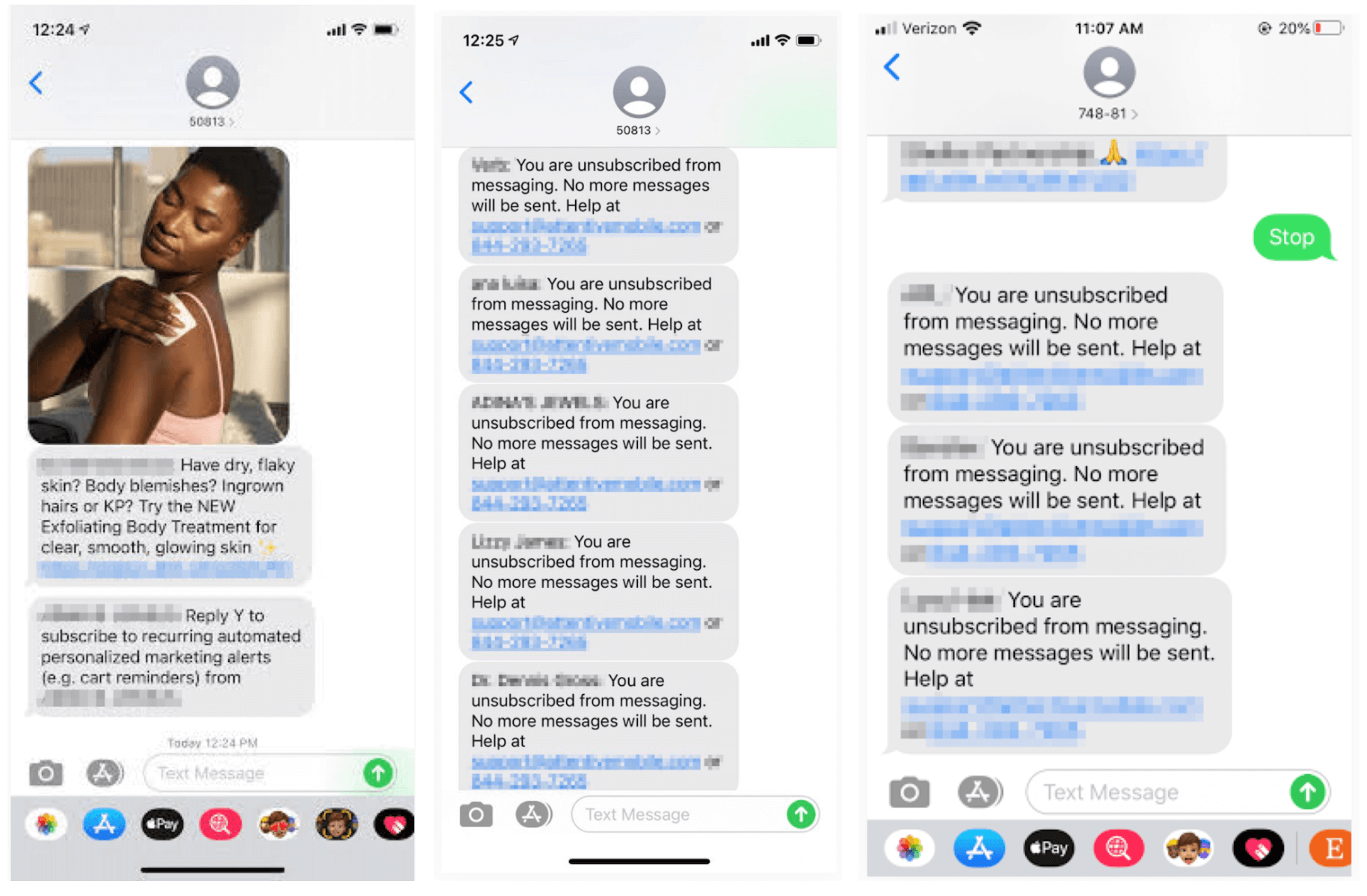This blog post is being constantly updated with new developments to provide the most accurate information. Stay tuned for more information.
SMS marketing is changing. To ensure your brand can continue to send messages, here’s the latest update.
What’s changing?
This year, brands will no longer be able to use shared numbers to send messages.
According to T-Mobile’s Code of Conduct, “shared 10DLC, short codes, and toll-free numbers are prohibited. Effective immediately, no new shared short codes are allowed to be onboarded, and all existing shared short codes will be required to migrate at a future date to a dedicated application address (short code, 10DLC, or toll-free number).”
AT&T’s A2P Code of Conduct similarly strikes against shared short codes, stating that “shared 10DLC or short codes are prohibited. Effective immediately no new shared short codes should be onboarded. All existing shared short codes will be terminated and banned at a future date to be determined and consistent with the commercial availability of 10DLC A2P Messaging.”
T-Mobile and AT&T are not the only carriers to make these changes; we expect other mobile providers to follow suit in the near future.
What are shared short codes and shared numbers?
Shared numbers are the phone numbers that brands use to send and receive text messages. Shared short codes, the most widely used shared number format, are 5-6 digit numbers shared between businesses.
Up until now, hundreds, or even thousands, of brands have been using the same shared short code to send their SMS marketing messages. In order to identify appropriate traffic for each brand, SMS solutions separate the traffic using identifiers. You may not even be aware that your brand is using shared short codes.
Below, you can see what shared short codes look like from a customer’s perspective.
Shared short codes have been a quick fix amongst SMS providers, but they’ve never been the most optimal SMS solution. The process of separating traffic makes shared short codes difficult to keep track of, and with so many messages sent this way, mobile operators consider shared short codes a spam risk.
How do shared short codes harm your brand’s customer experience?
- Your customers are receiving multiple messages from different brands all within the same message window.
- The customer cannot immediately tell who they’re receiving texts from, creating a negative, impersonal, spam-like experience.
- As a result of these generic, spammy experiences, customer engagement with SMS marketing messages decreases.
- Brands lose credibility, and with it they see declines in loyalty and revenue.
We believe your customer experience is what makes a brand. That’s why Yotpo SMS & Email has always provided brands with individual numbers at no extra cost.
From our own data, we’ve seen that brands who switch from shared short codes to dedicated numbers have 5x more conversations with customers.
What does this mean for your brand?
To mitigate the risk of spam, upcoming legislation will phase out shared numbers, including highly popular shared short codes, and instead dictate that each brand use a dedicated individual number created for their brand alone.
In order to accommodate this change, other SMS solutions will have to pivot from shared numbers to dedicated numbers. Without the right infrastructure in place, their customers will have to suffer the consequences and be forced to pay the additional costs necessary to abide by this change.
Yotpo SMS & Email is leading the industry with a built-in, scalable infrastructure to support these changes. We’ve got you covered at no extra cost.
For our community of eCommerce brands, we know how unplanned costs such as these can be disruptive to growth. That’s why we started building the infrastructure to support brands as they navigate these changes over a year ago. We’ve spent months stress testing and QAing to ensure our solution can provide the highest deliverability through dedicated numbers.
In fact, just this past Black Friday & Cyber Monday, every single SMS message sent from brands with Yotpo SMS & Email came from a dedicated phone number for each of those brands — no shared short codes.
“For us, SMS is about crafting personalized experiences. No buzzwords, it’s just the way we operate. We’re seeing top brands build truly personal connections with their customers via SMS marketing every day. From the beginning, we’ve seen the importance of enabling our brands to foster these relationships. That’s why we’ve made it our priority to provide a solution that, from the very first text, creates an experience that’s unique and memorable — and one that makes your customers excited to text with you.”
— Omer Bar-Joseph, General Manager, Yotpo
Why have we made these changes a priority? First and foremost, we believe in helping brands establish and foster authentic relationships with their customers. For us, those relationships are made stronger by enabling personalized messages, 1:1 conversations, community, and brand loyalty. Spam, via text or email, is counterintuitive to this belief.
As mobile commerce continues to skyrocket, brands should focus on building unique, personal experiences for their brands. SMS marketing is the ideal channel to create these experiences by fostering real conversations that deepen your relationships with every customer.
As the industry evolves, Yotpo SMS & Email will evolve alongside it to continue to provide the most powerful SMS marketing solution on the market.
If you are currently using a shared short code, now is the time to switch. Get started with a dedicated number from Yotpo SMS & Email here.
















 Join a free demo, personalized to fit your needs
Join a free demo, personalized to fit your needs